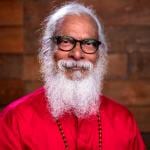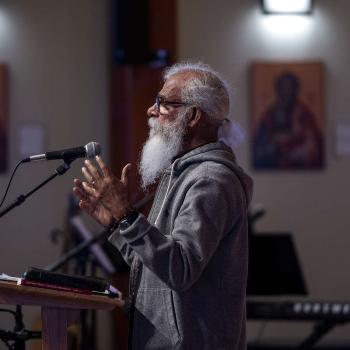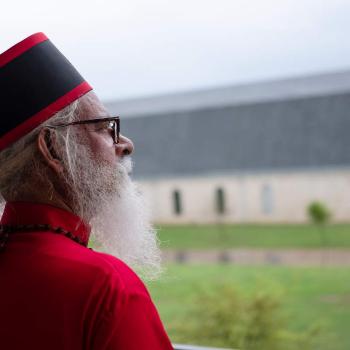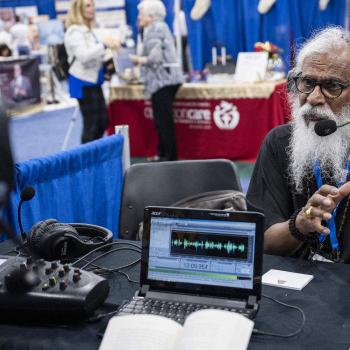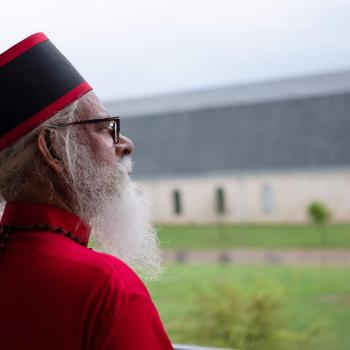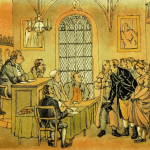WILLS POINT, TX – KP Yohannan, founder of Gospel for Asia (GFA World), whose heart to love and help the poor has inspired numerous charities like Gospel for Asia Canada, and Metropolitan of Believers Eastern Church, to serve the deprived and downcast worldwide — shares on the Christian life, the struggle with selfish ambition, and the need to take the easy yoke of Jesus upon ourselves.
If there is one verse in the entire Bible that speaks volumes of what it means to be filled with the Holy Spirit or to experience the fullness of the Lord and have His rivers of living water flow out of us unhindered, it is Galatians 2:20—
I have been crucified with Christ; it is no longer I who live, but Christ lives in me; and the life which I now live in the flesh I live by faith in the Son of God, who loved me and gave Himself for me.
It’s a familiar verse to many of us. But please, take a moment to pause and think about what it is saying.
This “I,” this “me” who is so important, has “ . . . been crucified, it’s no longer I who live . . .”
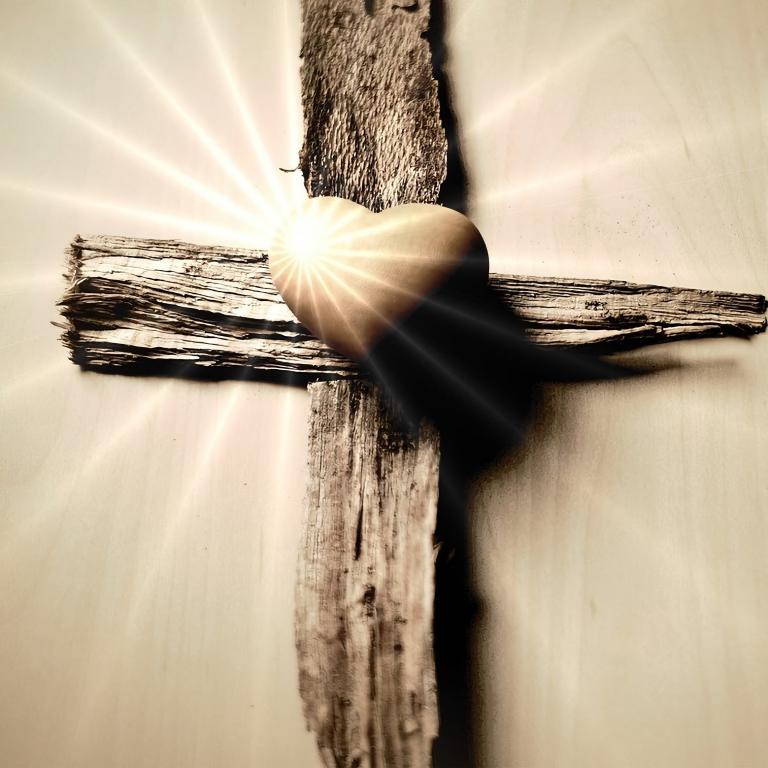 Someone once said, “There is a cross and there is a throne in all our lives. If ‘I’ is on the throne, then Christ is on the cross. If Christ is on the throne, then ‘I’ is on the cross.”
Someone once said, “There is a cross and there is a throne in all our lives. If ‘I’ is on the throne, then Christ is on the cross. If Christ is on the throne, then ‘I’ is on the cross.”
Jesus talked about this in John 12:24–25, “I say to you, unless a grain of wheat falls into the ground and dies, it remains alone; but if it dies, it produces much grain. He who loves his life will lose it, and he who hates his life in this world will keep it for eternal life.”
Jesus’ contemporary, Eusebius, records the account of a king from a small kingdom who, after hearing of the Jewish leaders’ plot to kill Jesus, sent a few of his men to deliver a letter to Him inviting Him to live in their kingdom. The contents of the letter delivered were something like, “We understand the Jews are plotting to kill You. Having learned much about You, I believe You are a good man and teacher. Please come and be part of my kingdom and rule with me. We will take care of You.”
John 12:20–21 (NIV) mirrors this account: “Now there were some Greeks among those who went up to worship at the Feast. They came . . . with a request. ‘Sir,’ they said, ‘we would like to see Jesus.’ ”
According to Eusebius, the answer Jesus gave to their request was very similar to John 12:24–25. In essence, what Jesus said was, “You want to see Me? If you really want to see Me, you must die. Only through death will you find Me.”
Jesus’ answer is the same today. If we want to see Him and have His beauty and love seen in us, we must die. We must be that grain of wheat that falls to the ground, broken and crushed, to see greater life produced.
But oh how you and I try so hard, even in Christian service, to preserve our own lives, even when Jesus clearly said that if we hold on to our lives we would lose them. We will remain as we are. Fifty years we can live and study the Bible and become an expert, and still, we will not see Him.
On the pages of the Bible, you will see Jesus—the One who dwells in such light that when you gaze upon His face you change without trying. Second Corinthians 3:18 tells us, “But we all, with unveiled face, beholding as in a mirror the glory of the Lord, are being transformed into the same image from glory to glory.” That transformation, that change can only take place when our hearts are pure. In one of Jesus’ first sermons He told the crowd that had gathered, “Blessed are the pure in heart, for they shall see God” (Matthew 5:8).
But what does it mean to be pure in heart?
A pure heart has no soulish life in it, no selfish ambition for itself because that “I” has been crucified. With the pure heart, there is no hindrance from Christ within coming forth because there is no contamination from the self-life.
Over my years of ministering, the Lord has had to rebuke me several times after speaking and teaching from His Word. I repent over those times. Even though my speech was absolutely eloquent and people were moved by the words I shared, when it was all over, very quietly the Lord would say to me, “You failed Me miserably.”
“How, Lord?”
“It was all contaminated. You spoke truth, but it was all mixed up with your soulish life. A bit of dirt makes all the water impure. People were deeply moved emotionally and intellectually, but no life can come out of it.”
In Matthew 11:29–30, we read one of the most beautiful Scripture portions ever recorded. It is the invitation of Christ—“Take My yoke upon you and learn from Me, for I am gentle and lowly in heart, and you will find rest for your souls. For My yoke is easy and My burden is light.”
When Jesus said, “Take My yoke upon you . . .” we must realize that only a broken animal will bend its neck and take the yoke.
For example, I grew up in a place where my people are rice farmers, and we didn’t have machinery then or now to plow the fields. You know how we do it? We use two buffaloes.
I remember as a small boy, looking at the fields where they would be used to plow. Year after year, hundreds of times, I saw the same scene—the buffaloes standing there, not making a single noise. They would never run away. They just stood there. And right there in the field beside them would be a skinny, little man with hardly any clothes on and a tiny stick in his hand. The buffalo would bend its neck as the yoke was brought—there was no fight, no resistance, no squabble, nothing. The buffalo simply yielded its rights.
But then, if you were to look closely, you would see two or three deep scars on the rear of the buffalo. Those scars were made at the time the animal was broken, when it was trained. These buffaloes are strong-willed creatures. With their massive and strong horns, they are capable of killing a man with a single toss of the head. But now they are different. They are broken.
Every servant of God must go through a similar process. Paul speaks of bearing on his body “the marks of the Lord Jesus” (see Galatians 6:17). Christ was broken on the cross. The whiplashes on His back, the thorn piercing on His head, the nail holes in His hands and feet are His brand marks. They speak forever of the humility He chose to walk in on this earth.
Again, we must hear the invitation of Christ—“Come, yield your rights, let go of your own will and take My yoke. It is easy. It is light. Come, learn from Me, for I am gentle and lowly, and you will find rest for your soul.”
Excerpted from The Beauty of Christ through Brokenness by KP Yohannan. Copyright © 2004 by KP Yohannan. (Carrollton, TX: gfa books).
Keep encouraged and get your regular dose of challenge through other articles on Patheos by KP Yohannan Metropolitan, or on his blog at kpyohannan.org.
You can learn more about K.P. Yohannan Metropolitan by clicking here.
About KP Yohannan
KP Yohannan, founder and director GFA World (Gospel for Asia) and Metropolitan of Believers Eastern Church, has written more than 250 books, including Revolution in World Missions, an international bestseller with more than 4 million copies in print. He and his wife, Gisela, have two grown children, Daniel and Sarah, who both serve the Lord with their families.
About Gospel for Asia
Gospel for Asia is a Christian-based charity serving the “least of these” in Asia since its beginning in 1979,often in places where no one else is serving. Gospel for Asia workers serve on the field as the hands and feet of Christ by ministering to people’s needs so they can understand the love of God for them for the first time. Gospel for Asia helps provide funds for dozens of projects, such as caring for poor children, slum dwellers and widows and orphans; providing clean water by funding wells; supporting medical missions; and meeting the needs of those in leprosy colonies.
Find out more about Gospel for Asia in the video “A Year in Review with K.P. Yohannan.”
Read what George Verwer, Francis Chan, Dr. David Mains and others have to say about GFA World.
Learn more about KP Yohannan, Founder of GFA World, and Metropolitan of the Believers Eastern Church: Facebook | Radio | Twitter | Amazon | Sermon Index | Goodreads | OnePlace | About | Integrity | Lawsuit Update | 5 Distinctives | 6 Remarkable Facts | Book | Wikipedia | Francis Chan | Lawsuit Response |



